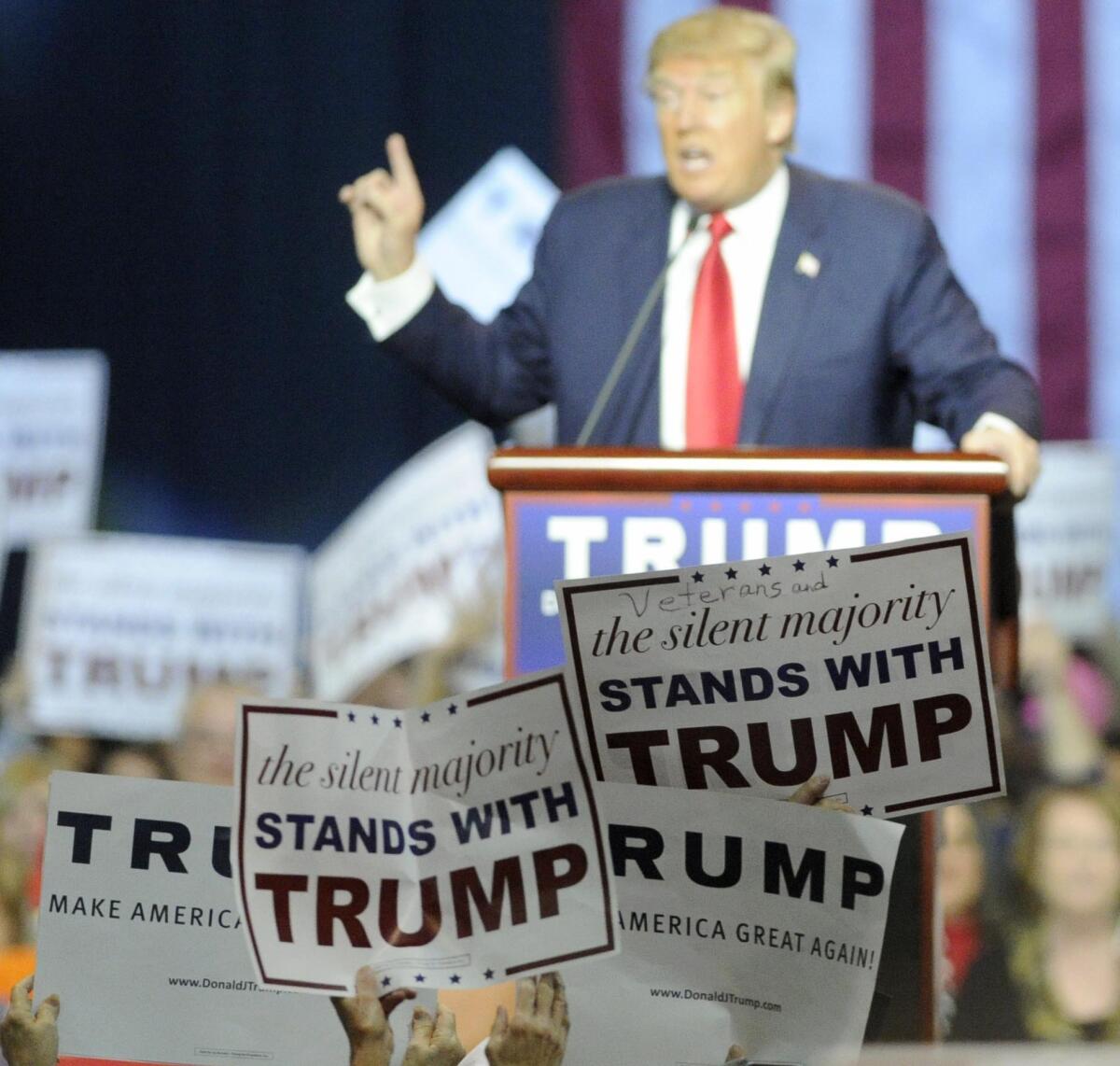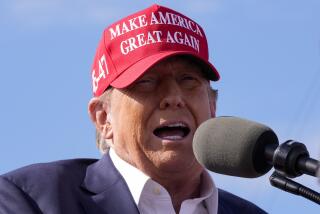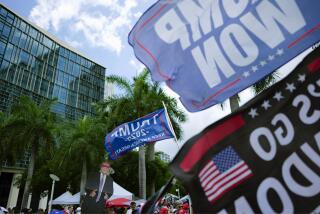Opinion: Trump’s appeal exposes a national undercurrent of intolerance

Fans show support as Republican presidential candidate Donald Trump speaks during a campaign stop Saturday in Birmingham, Ala. That his message of intolerance resonates says more about Americans than it does about Trump.
The tycoon who would be president, Donald Trump, recently endorsed supporters who roughed up a protester at one of his campaign events. “Maybe he should have been roughed up,” Trump told Fox News over the weekend, “because it was absolutely disgusting what he was doing.” This was after Trump suggested in other settings that Muslims be forced to wear identifying markers and be tracked through a national database. All of which overshadows his earlier comments about Mexican immigrants
There is a lot here to be outraged by, from Trump’s dismissal of a protester as “disgusting” to his embrace of thuggery to his demonization of Muslims and Mexicans. As Vox points out, Trump also recently retweeted some bogus stats about racial breakdown of homicides – a tweet that seems to have originated with someone espousing neo-Nazi beliefs, and that Trump chose not to disavow once the fake stats were pointed out. This isn’t to say Trump is a throwback fascist. My guess is the guy listens only to himself, and that’s a pretty inept echo chamber.
But Trump’s signal to supporters that roughing up political opponents pushes what had been a clownish political performance into a dangerous zone. It’s the move from rhetoric to action.
These are not small things. Bigotry is an inextricable part of the American fabric, unfortunately, but it’s something political leaders in this modern age should be campaigning against instead of supporting.
And it’s not abstract. Over the last few weeks, several people have been arrested or convicted or, in one case, sentenced to death in connection with alleged white-supremacist hate crimes, including the men who shot into a Black Lives Matter protest of the killing of a black man by Minneapolis police. Openly armed protesters (one carrying a Ted Cruz presidential campaign sign) appeared last weekend outside a Dallas-area mosque to complain about the “Islamization of America.”
The guns were “mostly for self-defense or protection,” according to organizer David Wright, who brought along a 12-gauge shotgun. “But I’m not going to lie. We do want to show force. … It would be ridiculous to protest Islam without defending ourselves.”
As a local city councilman pointed out, the protesters faced no threat to justify carrying rifles and shotguns.
“My initial impression was they were using them for intimidation,” councilman David Palmer told the Dallas Morning News. “I doubt that they’d be happy if some of the Muslim churchgoers here showed up at their Christian church, their Baptist church, their Methodist church tomorrow morning with rifles slung over their shoulders.”
Notably, the people who gathered on the street were not there to make a political statement. They went with deadly weapons to protest the faith of others, using what they profess is a freedom established by the 2nd Amendment to implicitly threaten people engaged in an act protected by the 1st Amendment.
As Dallas Mayor Mike Rawlings said the other day, these are the folks who pose the immediate and daily threat to American citizens, not the millions fleeing war in Syria and Iraq. “I am more fearful of large gatherings of white men that come into schools, theaters and shoot people up, but we don’t isolate young white men on this issue,” Rawlings said.
Religious, racial and ethnic intolerance has been an ugly undercurrent in America from the beginning. It propelled European treatment of Native Americans, it was the underpinning of slavery, and it remains a potent force in contemporary society. A 2013 federal Justice Department report estimated 259,700 nonfatal violent and property hate crimes are committed in the U.S. each year, about 1 in 5 based on religion, and a little more than half based on race.
Then there’s the everyday American slaughter – at least 431 killed and another 1,227 wounded in 337 mass shootings (at least four victims) this year through Nov. 20, according to data collected by ShootingTracker.com.
But back to Trump. I don’t see a path to the White House (and neither does Nate Silver) for Trump or fellow contender Ben Carson, who recently compared Syrian refugees to a rabid dog. The Republican nomination? Maybe, but unlikely. Still, that these are the ideas propelling the GOP nomination campaign at this point is appalling.
When leading political figures – and the potential presidential candidates for a major political party – spew racist tripe, it’s easy to call them on it (though it would reflect better on the party if more Republicans stood up to the demagogues). But that such extreme views find a significant audience is the more troubling part, signaling that xenophobia has moved into the edges of political acceptability.
That imperils our society more than the longshot chance the Islamic State might embed a terrorist among Syrian and Iraqi war refugees to sneak in two years down the road and cause some mayhem. By then, we’ll have shot dead 20,000 or more of our fellow citizens ourselves, some out of racial hatred, some by accident, some in the commission of robbery or other crime, some out of an inability to resolve a domestic dispute without violence.
This is the where the immediate threat resides – within ourselves.
Follow Scott Martelle on Twitter @smartelle.
More to Read
A cure for the common opinion
Get thought-provoking perspectives with our weekly newsletter.
You may occasionally receive promotional content from the Los Angeles Times.







